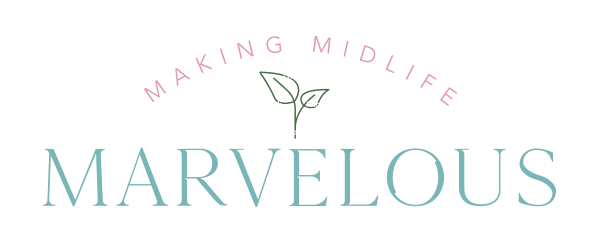It seems like a cruel joke that at about the same time we are journeying through our menopause transformation, another significant life transition is likely happening; we are learning how to be moms to adults, and our homes are on the way to becoming empty nests.
We are in the time of life when not only are we being asked to let go of our children as they find their way out into the world, our very own bodies are finding a new ‘normal’ and shifting us into the entirely new physical state of menopause. For those wrapped up in hurting hearts, feelings of grief, loneliness, sadness, and confusion, did you even know a perfect storm of biochemical changes are also happening that can magnify the intensity of loss and despair?
While we likely know about the physical symptoms of menopause, we are also experiencing many, very real mental changes we likely have never heard anything about.
Understanding some of our brain’s unique alchemy in midlife can help us comprehend, at least in part, the extreme nature of why many midlife mommas feel so out of sorts.
Our brains are literally changing.
Apart from changes in our monthly cycles, changes in our two main sex hormones, estrogen and progesterone, are quite literally impacting our brains in midlife. Here are a few specifics to help empower an understanding and take away some of the mysteries and sigmas of this time of life.
The short version of the story is that as progesterone and then estrogen decline our brains actually need time to adjust.
For women after 40, Dr. Lara Briden in her book, Hormone Repair Manual, describes the changes to our brains at midlife as a literal rewiring. This mental reconstruction of sorts is at the root of symptoms like mood swings, sleep issues, hot flashes, and brain fog.1
Among its myriad of roles, Dr. Briden explains specifically how for decades in our lives estrogen has been reducing inflammation and boosting the feel good neurotransmitter, serotonin. Therefore as it declines we are more significantly impacted by the negative effects of stress.2
So while you may try to convince yourself and others that your strong feelings are just your imagination, when serotonin is impacted it is very likely things actually do bother you more than they used to.
Also since puberty, our brains have had a powerful calming ally from the effects of progesterone. In midlife progesterone greatly declines, and without it we can experience problems sleeping, migraines, and a whole host of anxiety related symptoms. A lack of progesterone is an additional reason why we feel less able to cope with stress.3
In fact, groundbreaking new research by associate professor of neuroscience in neurology and in radiology, as well as the director of the Women’s Brain Initiative at Weill Cornell Medicine, Dr. Lisa Mosconi, is specifically studying how our brains change at menopause to help women better care for our mental health.
In her book, The XX Brain, Dr. Mosconi talks about how our brains have been wired to respond to estrogen and progesterone since conception. With the hormone surge that comes at puberty the female brain literally becomes addicted to them and their effects. Add to this the fact that estrogen specifically helps our brains use carbohydrates for energy, and it’s not hard to understand when hormones decline we feel it in our brains.
Dr. Mosconi has also helped shed light on the abundance of estrogen and progesterone receptors in specific areas of the brain. These receptors, the lock to our hormones’ keys, aren’t getting ‘unlocked’ like they used to. This concept provides a better understanding of some common menopause symptoms like hot flashes and sleep disturbances.
Here are some examples of areas in the brain that have an abundance of estrogen receptors and why when estrogen decreases menopause symptoms can occur as I heard Dr. Mosconi describe in this podcast, The Secrets Of The Female Brian, about her research:
| Area Of The Brain | Help With | Menopause Symptom |
|---|---|---|
| Hypothalamus | body temperature regulation | hot flashes and body temperature dysregulation |
| Brain stem | sleep regulation | sleep disturbances |
| Amygdala | regulating emotions | extreme emotions and mood swings |
| Hippocampus | memory | brain fog and memory lapses |
The bottom line is as estrogen declines our physical symptoms are rooted in concrete changes to our neurological system. Our symptoms – including those that are mental and emotional – are real and our brains need time to adjust. So yes, it’s all in your head for very good reasons!
The Role Of Stress
As if the changes in our brain chemistry weren’t enough, we also need to understand the role of stress in making an already precarious transitional time for our brains worse. Stress, whether physical like illness or emotional like relationship issues, result in an elevation of another hormone called cortisol. Even perceived stress which comes from worrisome or anxious thoughts increases cortisol.
Part of our body’s fight or flight system, cortisol’s job is to help our bodies make all the needed adjustments to mount a defense – even if no real threat is imminent. Continuously high cortisol levels only add to the cascade of menopause symptoms we might already be experiencing.
In her book, Adrenal Thyroid Revolution, Dr. Aviva Romm goes into great detail about how cortisol can interfere with the balance of other hormones as well as increase anxiety, digestion issues, and weight gain.
Additionally, Dr. Mosconi’s work has also shown that constantly high levels of cortisol resulting from chronic stress causes women’s brains to suffer to the point that high cortisol is correlated with brain shrinkage in post menopausal women! 4
How to Support Our Midlife Momma Brains
One of the things I love most about my midlife career pivot to health coaching is I now have wellness resources I never knew existed before. Rather than “just because” the reason I’d been given by women who had gone before me, these resources give me an understanding of the root cause “why” of symptoms and how healthy lifestyle changes can help. These insights make me much more likely to change diet and lifestyle behaviors and stick with them. Combining expert research and advice I trust with my own common sense, is enabling changes that work for me.
I have discovered that practically all of the healthy diet and lifestyle habits I knew were good for my body are also good for my brain. Supported by the work of the doctors I’ve already mentioned (Briden, Mosconi, Romm) and others, here are some of the things I’m doing to support my body and my mind in this middle part of life.
I Eat For My Brain’s Health
Feeling snippy, irritable, angry and upset seem to happen like the flip of a switch for me these days. One social media post or news story and my mood can go sideways in a hurry.
Sadly, before menopause I didn’t think about food’s impact on the health of my brain. Of course I knew when I was craving food or feeling ‘hangry’, but the nuts and bolts of nutrition as far as my brain’s operating system was concerned didn’t cross my radar.
But now I think about my brain’s nutritional needs differently. My focus is on eating whole, real food. If it comes in a package, box, or bag I think twice before making it a regular part of my routine. Knowing that MSG and other food additives have been shown to damage brain cells and impair memory, I take into account the ingredient label on these kinds of foods. (If you’d like more information about reading food labels and some ingredients to avoid, this article gives a nice overview.)
I’ve also become more diligent about limiting the amount of sugar and refined carbohydrates I eat. Because our brains use a lot of energy, they are also susceptible to oxidative stress from sweets and starchy foods like breads and pastas. Therefore, as important as blood sugar regulation is to prevent diabetes, it is important for my brain’s health too. Interestingly, because of the ill effects of sugar on our brains, there is mounting evidence that Alzheimer’s disease may one day be referred to as type 3 diabetes.
With my brain’s health for added motivation, I’m eating more fibrous vegetables and limiting sweet and starchy carbs like pastas and breads. Dr. Mosconi goes into great detail about the carbohydrates that work best for a woman’s brain. She points out that quality and quantity matter and is very specific about the fact that complex carbohydrates, which contain high amounts of fiber, are best.5
Specifically for women leading up to and through menopause, Dr. Briden explains that unregulated insulin from high blood sugar has a bigger impact on our brains than when we were younger. As she explained in a social media post recently:
When estrogen drops at menopause, it triggers a temporary drop in brain energy which contributes to symptoms such as hot flashes, sleep disturbance, and memory loss.
If the brain can adapt by switching from glucose to ketones, symptoms should be temporary.
If the brain cannot adapt because of insulin resistance, symptoms can persist and lead to an increased risk of dementia.
Ketones are created when our bodies use fat for fuel instead of carbohydrates, so keeping sugar and refined carbs lower helps promote a type of metabolic flexibility that is actually good for our brains.
Our brains get information from the food we eat, and each color has its own specific nutritional component called a phytonutrient. There are very real and documented health benefits of all phytonutrients, so eating a rainbow everyday is incredibly important not just for our bodies but also for our brains.It makes sense that the better I eat, the more clearly I think. The more clearly I think, the more emotionally stable I feel, and eating a rainbow of color from nature daily feels great!
I love the work by Dr. Deanna Minich. Her website is full of free resources like the Eat the Rainbow Toolkit, and The Rainbow Diet Color Wheel with really great ideas that are fun too!
I Protect My Brain From Toxins
This is a challenge because it seems our world is getting more toxic by the minute. Yet knowing that toxins negatively impact the brain, reducing the stress on my brain by replacing or removing as many environmental toxins as I can has become increasingly important to me.
To reduce the toxic load of pesticides and herbicides, I eat as much organic food as possible. This has expanded over the years as I’ve found more local and online resources that I trust. It is important to understand the laws around the “organic” labeling to keep from being duped by false and misleading packaging. The Environmental Working Group’s Clean 15 and Dirty Dozen are great places to start when making decisions about what produce is best to buy organic.
The Environmental Working Group is also a great resource when it comes to cleaning and personal care products. Toxins are easily absorbed by our skin so it is important to understand that these chemicals also add to our body’s toxic stress and have an impact on our mental health.While we’re on the topic of toxins, alcohol falls into this category for me. We’ve been led to believe that some alcohols like wine have health benefits, but the latest evidence strongly suggests there is no measurable health benefit from any amount of alcohol – even red wine. And because alcohol has also been shown to be toxic to the brain, I choose to avoid it altogether. Personally, I’d rather eat my calories.
I Move For My Brain’s Health
If you’re like me, for decades you’ve viewed exercise through the lens of physical well being. While yes, our bodies need to move in order to age well (the “move it or lose it” motivation), now there is also mounting evidence that physical exercise – specifically weight bearing activities done to build lean muscle are great for our mental well being too.
While walking, stretching, and more gentle movements are also important, strength training, in particular, has shown very promising results in helping to improve mild cognitive decline with indications that the greater the gains in strength, the greater the improvement in cognitive test scores. Specifically because weight training has been shown to not only improve symptoms like hot flashes but long-term brain health as well, I will make it a part of my movement routine forever.
And finally in terms of brain healthy activities, all types of movement help reduce insulin resistance which I’ve already mentioned as being ideal for the health of our brains. So the bottomline is keep moving!
I’m Learning How To Soothing My Nervous System For My Brain’s Health
I have a natural tendency to be “on” all the time. Even if your kids left the house years ago, there is a strong possibility your mom-ears, mom-nose, and mom-eyes-in-the-back-of-your-head are still turned on too. For me, motherhood brought so much to do and worry about that the fight-or-flight system I talked about earlier feels stuck in the on position.
While our momma-spidey sense served us well with our babies and small ones, being on constant high surveillance is not good for our midlife brains. (remember stress = cortisol and constantly high cortisol is correlated with our brains shrinking!)
Understanding that the opposite to this always-turned-on system is the able-to-tune-out, rest-digest-recover part, I am actively pursuing ways to soothe myself. This isn’t easy especially since always-on feels so natural and normal to me!
However the evidence is clear, stress – no matter what form, whether physical, environmental, mental, emotional, or even imagined – has a real and lasting impact on the health of our brains.
Unfortunately there is no one-size-fits-all approach to calming our nervous systems. But fortunately there are many avenues to try in order to find one that works for you. Dr. Mosconi describes R&R for the mind in things like:
- Making time for friends
- Unplugging from electronics and choosing to get out into nature instead in what she called “green time over screen time” 6
- Meditation – which can include nuanced types like walking meditation, doing-the-dishes meditation, and a special singing medication called Kirtan Kriya. Meditation can even take the form of a hobby or any activity that you love and in doing so you lose complete track of time. Mental health experts call this a flow state.
- Yoga
- Acupuncture, and last but not least
- Prioritizing sleep
So midlife mommas, as our homes and our bodies are changing, giving our mental health a double whammy of sorts, there is a lot we can do to mitigate the effects of declining hormones and escalating emotions.
Diet and lifestyle changes through food and movement will go a long way to help calm some of the emotional storms at midlife. When we prioritize a decrease in toxins and stress while also increasing rest and relaxation, we can help our brains adjust and cultivate a new normal.
No. You’re not crazy! It is a huge transitional time on multiple fronts! But with more understanding of our brain’s midlife physiology we can be better equipped to handle these twin transitions.
Lifestyle changes can be challenging and often take time to implement. This is where working with a health coach, like me, can have many added benefits. Not only can I help you better understand what’s happening in your body, but together we can set goals, celebrate victories, and create your more marvelous midlife.
If you’d like help staying strong and active for life’s second half, you can find out more at www.makingmidlifemarvelous.com or send me an email and we can chat to see if health coaching is right for you.
Resources:
1 – Hormone Repair Manual, by Dr. Lara Briden pg. 147
2 – Hormone Repair Manual, by Dr. Lara Briden pg. 148
3 – Hormone Repair Manual, by Dr. Lara Briden pg. 148-184
4 – The XX Brain, by Dr. Lisa Mosconi pg 244
5 – The XX Brain, by Dr. Lisa Mosconi pg 169-172
6 – The XX Brain, by Dr. Lisa Mosconi pg 248-261




